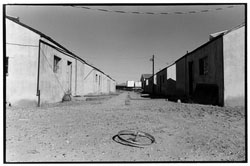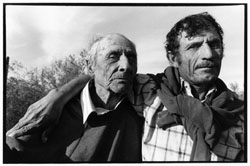

Working
Communities
project support
from the
Rockefeller Foundation
 Braceros & Border Jumpers |
 Miners & Mayos |
People migrating between the U.S. and Mexico and Guatemala belong to transnational communities - they retain ties to their communities of origin, and establish new communities in new areas as they migrate in search of work. Those ties are often so strong, and the movement of people back and forth is so great, that in some sense people belong to a single community which exists in different locations, on both sides of the border.
This project looks at the lives of people, the ties that bind them together, their relation to work and the pursuit of work, the nature and scope of their poverty, and how they struggle for a better life, both individually and as a community. It looks at migrants from Mexican, Guatemalan and U.S. perspectives, through first-hand accounts of people themselves.
Poverty in the U.S. is intimately connected with poverty in Mexico and other countries of the developing world. People have to maintain more than one household, supporting communities of origin with remittances earned from work in the U.S. The work available to migrants is often very low-paid and the working conditions dangerous and unhealthy. This creates an economic impact on communities of immigrant workers in the U.S., and affects their stability. While the income of migrants in the U.S. is often many times what is possible for families in communities of origin, working communities of migrants still have survival problems because of the relation between their income and what it costs to survive in the U.S.
But while often economically poor, migrant communities are rich in cultural and organizational traditions which help them to survive and work for a better life. Immigrants from the same town often belong to soccer teams, in a larger league which groups together teams from different towns and states. Indigenous workers speaking Mixtec, Zapotec or Triqui set up organizations to defend their interests, like the Mixtec Binational Front. Family networks running from Puebla to Reynosa to Los Angeles to Omaha to Madison help family members immigrate from home communities, and provide support when people arrive. Those same networks often provide a support framework for mutual aid societies during periods of labor conflict.
These networks are creating a culture with its own songs, food, slang expressions in language, and other manifestations. This culture has an impact on the larger communities and organizations in the U.S. of which immigrants become a part. The impact of immigrant workers sparks everything from a renaissance marimba music and an open, inclusive style of union organizing.
By documenting this process in photographs and interviews, we can understand this experience better, through the eyes and voice of those for whom it is a living reality.
WORKPLACE | STRIKES | PORTRAITS | FARMWORKERS | UNIONS | STUDENTS
Special Project: TRANSNATIONAL WORKING COMMUNITIES
HOME | NEWS | STORIES | PHOTOGRAPHS | LINKS
photographs and stories by David Bacon © 1990-
website by DigIt Designs © 1999-